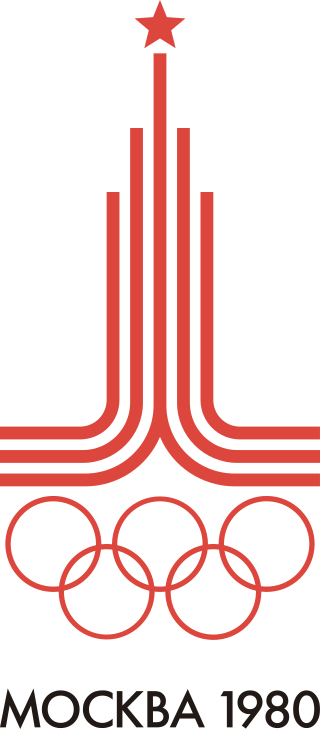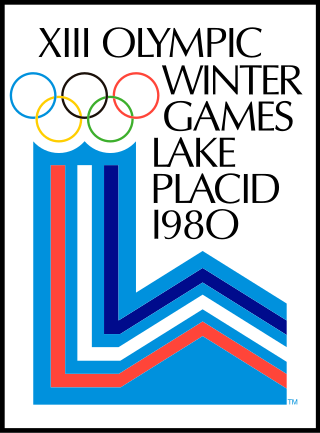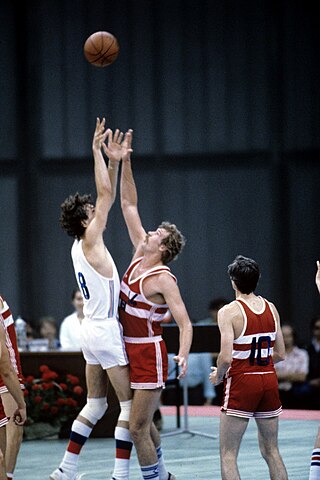
The 1984 Summer Olympics were an international multi-sport event held from July 28 to August 12, 1984, in Los Angeles, California, United States. It marked the second time that Los Angeles had hosted the Games, the first being in 1932. This was the first of two consecutive Olympic Games to be held in North America with Calgary, Alberta, Canada hosting the 1988 Winter Olympics. California was the home state of the incumbent U.S. president Ronald Reagan, who officially opened the Games. These were the first Summer Olympic Games under the IOC presidency of Juan Antonio Samaranch.

The 1980 Summer Olympics, officially known as the Games of the XXII Olympiad and officially branded as Moscow 1980, were an international multi-sport event held from 19 July to 3 August 1980 in Moscow, Soviet Union, in present-day Russia. The games were the first to be staged in an Eastern Bloc country, as well as the first Olympic Games and only Summer Olympics to be held in a Slavic language-speaking country. They were also the only Summer Olympic Games to be held in a self-proclaimed communist country until the 2008 Summer Olympics held in China. These were the final Olympic Games under the IOC Presidency of Michael Morris, 3rd Baron Killanin before he was succeeded by Juan Antonio Samaranch shortly afterward.

The 1980 Winter Olympics, officially the XIII Olympic Winter Games and also known as Lake Placid 1980, were an international multi-sport event held from February 13 to 24, 1980, in Lake Placid, New York, United States.

The World Athletics Championships, known as the IAAF World Championships in Athletics until 2019, are a biennial athletics competition organized by World Athletics, formerly International Association of Athletics Federations. Alongside Olympic Games, the championships represents the highest level of senior international outdoor athletics competition for track and field athletics globally, including marathon running and race walking. Separate World Championships are held by World Athletics for certain other outdoor events, including cross-country running and half-marathon, as well as indoor and age-group championship.

The "Miracle on Ice" was an ice hockey game during the 1980 Winter Olympics in Lake Placid, New York. It was played between the hosting United States and the Soviet Union on February 22, 1980, during the medal round of the men's ice hockey tournament. Although the Soviet Union was a four-time defending gold medalist and heavily favored, the United States achieved an upset victory, winning 4–3.

Misha, also known as Mishka or The Olympic Mishka, is the name of the Russian Bear mascot of the 1980 Moscow Olympic Games. He was designed by children's books illustrator Victor Chizhikov.

The 1980 Summer Olympics, officially known as the Games of the XXII Olympiad, were an international multi-sport event held in Moscow, Soviet Union, from 19 July to 3 August. They were the first Olympic Games to be staged in a communist nation. A total of 5,179 athletes representing 80 National Olympic Committees (NOCs) participated. This was the fewest number of participating NOCs since 1956, which included seven teams making their Olympic debut at the Summer Games; Angola, Botswana, Cyprus,, Jordan, Laos, Mozambique, and Seychelles. The games featured 203 events in 21 sports across 27 disciplines.

The FIS Nordic World Ski Championships is a biennial Nordic skiing event organized by the International Ski Federation (FIS). The World Championships was started in 1925 for men and opened for women's participation in 1954. World Championship events include Nordic skiing's three disciplines: cross-country skiing, ski jumping, and Nordic combined. The Winter Olympics from 1924 to 1980 were also the Nordic World Ski Championships. This meant that the Olympic champions were also World champions and received an additional medal from the International Ski Federation (FIS). Since 1985, the World Championships have been held in odd-numbered years.

Basketball at the 1980 Summer Olympics was the tenth appearance of the sport of basketball as an official Olympic medal event. It was held from July 20 to July 30 at the Olympiiski Indoor Stadium and at the CSKA Sports Palace, both located in Moscow, Russian SFSR, Soviet Union. Finals of men's events were held 30 July at the Olympiiski Indoor Stadium.
The football tournament at the 1980 Summer Olympics started on 20 July and ended on 2 August. Only one event, the men's tournament, was contested. Seven qualified countries did not participate, joining the American-led boycott in protest of the December 1979 Soviet invasion of Afghanistan.

The 1980 Summer Olympics boycott was the largest boycott in Olympic history and one part of a number of actions initiated by the United States to protest against the Soviet invasion of Afghanistan. The Soviet Union, which hosted the 1980 Summer Olympics in Moscow, and its satellite states later boycotted the 1984 Summer Olympics in Los Angeles.

Basketball at the Summer Olympics has been a sport for men consistently since 1936. Prior to its inclusion as a medal sport, basketball was held as an unofficial demonstration event in 1904 and 1924. Women's basketball made its debut in the Summer Olympics in 1976. FIBA organizes both the men's and women's FIBA World Olympic Qualifying Tournaments and the Summer Olympics basketball tournaments, which are sanctioned by the IOC.

Alpine Skiing at the 1980 Winter Olympics consisted of six alpine skiing events. The races were held February 14–23 at Whiteface Mountain in Wilmington, New York, northeast of host Lake Placid.

The FIS Alpine World Ski Championships is an alpine skiing competition organized by the International Ski Federation (FIS).

Field hockey made its debut at the Modern Olympic Games as a men's competition in the 1908 Games in London. It was removed from the Olympic schedule of the Summer Olympic Games for the 1924 Paris Games and was reintroduced in the 1928 Amsterdam Games. The Women's field hockey was introduced into the Olympic programme at the 1980 Moscow Olympics.

Aleksandr Nikolaevich Dityatin is a retired Russian gymnast, three-time Olympic champion, and Honoured Master of Sports of the USSR. Winning eight medals at the 1980 Summer Olympics, he set the record for achieving the most medals of any type at a single Olympic Games. The American swimmer Michael Phelps has now twice equalled this record, at Athens 2004 and Beijing 2008. Dityatin competed for the Leningrad Dinamo sports society.
Louise Dorothy Ritter is an American former track and field athlete who won the gold medal in the high jump at the 1988 Olympic Games.
The Liberty Bell Classic was a track and field athletics event organized by the Athletics Congress as part of the 1980 Summer Olympics boycott and held at Franklin Field at the University of Pennsylvania in Philadelphia on July 16 and 17, 1980. It was named after Philadelphia's Liberty Bell.
Frances Anne "Francie" Larrieu Smith is an American track and field athlete. She was the flagbearer at the 1992 Summer Olympics in Barcelona for the United States of America. Larrieu Smith was the third female American athlete to make five American Olympic teams, behind the six of fencer Jan York-Romary and Track and Field's Willye White. The feat was later equaled by basketball player Teresa Edwards, track and field's Gail Devers, cyclist/speedskater Chris Witty and swimmer Dara Torres. After one of the longest elite careers on record, she retired from that level of competition.














